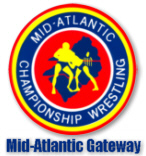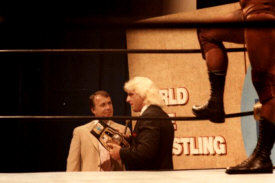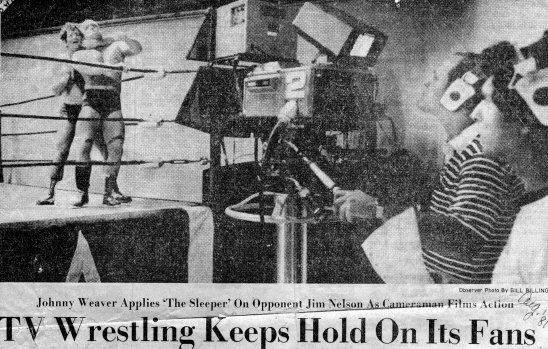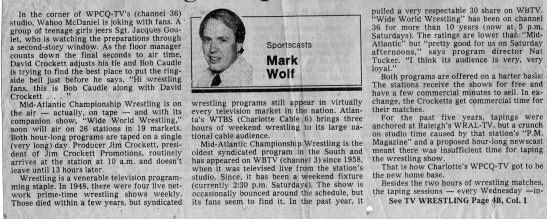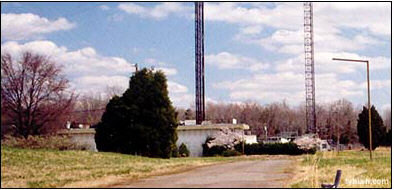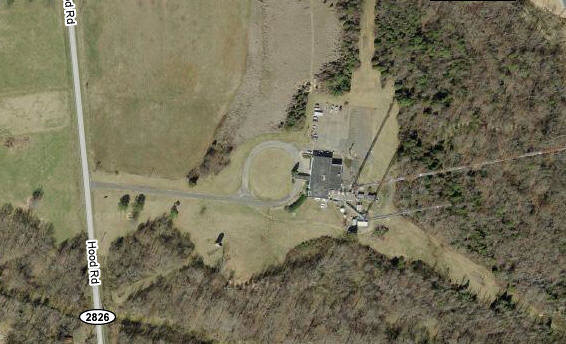|
WPCQ-36 Charlotte, NC |
||||
|
August 1981 article in Charlotte Observer about the move to WPCQ.
RETURN TO THE STUDIO WRESTLING INDEX RETURN TO THE MID-ATLANTIC GATEWAY Related Features:
The Birth of Mid-Atlantic TV Wrestling
|
||||
|
During the late summer of 1981, Jim Crockett Promotions moved their television tapings from their long time home at WRAL in Raleigh to the small studios of WPCQ TV in Charlotte. The first taping was Wednesday night, August 5. The change was brought about when WRAL began carrying the "PM Magazine" show which required the use of the studio for taping of the local segments of that show. There was also the issue of the local news broadcast expanding to an hour, placing more demands on studio time. Reportedly, the move was scheduled for WCCB-18 in Charlotte, across the street from the old Charlotte Coliseum, but that plan fell through and they hastily changed plans and moved to WPCQ. The WPCQ studios were hardly suited for wrestling. The ring had to be set in the studio at an angle in order for there to be room to fit in the cameras, announce desk and the studio hosts. Everyone involved reportedly detested these conditions, but regardless, the small confines were home to Crockett TV wrestling for nearly two years before moving out into small arenas to tape the weekly shows in 1983. WPCQ was also the home for the short lived East Coast Wrestling which showed arena matches and older studio tapes. The show was hosted by veteran Charlotte wrestling broadcaster Big Bill Ward. The final taping at WPCQ was on Wednesday night July 1, 1983. On Monday July 6, 1983, Crockett held his first independently produced wrestling taping for TV at the Greenville Memorial Auditorium in Greenville SC, utilizing his new TV truck, an operation named NEMO (National Electronic Mobile Operation.) |
||||
| BASIC INFORMATION | ||||
|
Call Letters: |
WPCQ |
|||
|
Channel Number: |
36 |
|||
|
Network Affiliate: |
NBC |
|||
|
Began Taping: |
August 5, 1981 |
|||
|
Ceased Taping: |
July 1, 1983 |
|||
|
Hosts: |
MID-ATLANTIC WRESTLING: Bob Caudle WORLD WIDE WRESTLING: Rich Landrum, David Crockett EAST COAST WRESTLING: Bill Ward |
|||
|
Color Commentators |
MID-ATLANTIC WRESTLING: David Crockett, Sandy Scott, Roddy Piper WORLD WIDE WRESTLING: Johnny Weaver |
|||
|
Ring Announcers: |
None (intros done from set) |
|||
|
Local Promo Announcers: |
Rich Landrum, Bill Ward, David Crockett, others - names unknown. |
|||
|
Night Taped: |
Wednesday |
|||
|
Show names: |
Mid-Atlantic Championship Wrestling World Wide Wrestling East Coast Wrestling |
|||
|
Two photos of NWA World Champion Ric Flair on the set of both programs taped at WPCQ studios. (L) Bob Caudle interviews the champ on the set of Mid-Atlantic Championship Wrestling as co-host Sandy Scott waits off camera. (R) World Wide Wrestling host David Crockett interviews Ric Flair. An unidentified wrestler waits for his match in the ring.
Charlotte Observer, August 1981. Article by Mark Wolf The clipping above was found in Johnny Weaver's personal scrapbook when we visited with him in November of 2007. The 2nd part of the article was not included. At some point, I am going to try and check the microfilm archives at a library and find the rest of this article, which provides some good information about the move from WRAL in Raleigh to WPCQ in Charlotte. Here is the text of the article (so far):
TV Wrestling Keeps Hold on its Fans (Thanks to Peggy Lathan for transcribing the WPCQ newspaper article.) |
||||
|
|
The old WPCQ studios in what was then the middle of nowhere. Actually on Hood Road, northeast of town. Crockett Promotions taped wrestling here for two years in the early 1980s. (Photo from fybush.com)
Satellite Image from Google Maps |
|||
|
|
|
|||
|
STUDIO WRESTLING INDEX | ALMANAC INDEX | GATEWAY HOME PAGE |
||||
|
STATION HISTORY
The station signed on in 1968 as WCTU-TV,
North Carolina's first independent station. Jim Bakker began his
television ministry at WCTU shortly after he broke off from Paul Crouch
and TBN. Other than the religious shows a couple hours a day, the
station aired cartoons, sitcoms, old movies and sports. The station hit
hard times financially and was put up for sale in 1972.
When Belo took over in 1997, it invested
large amounts of money in the station by hiring talent away from rival
stations. Belo also invested large amounts of money into new sets, a
news helicopter, a powerful live doppler radar system and other
equipment. For much of the early part of the 21st century, it has waged
a spirited battle with WBTV for second place behind WSOC. STUDIO WRESTLING INDEX | ALMANAC INDEX | GATEWAY HOME PAGE
|
||||
